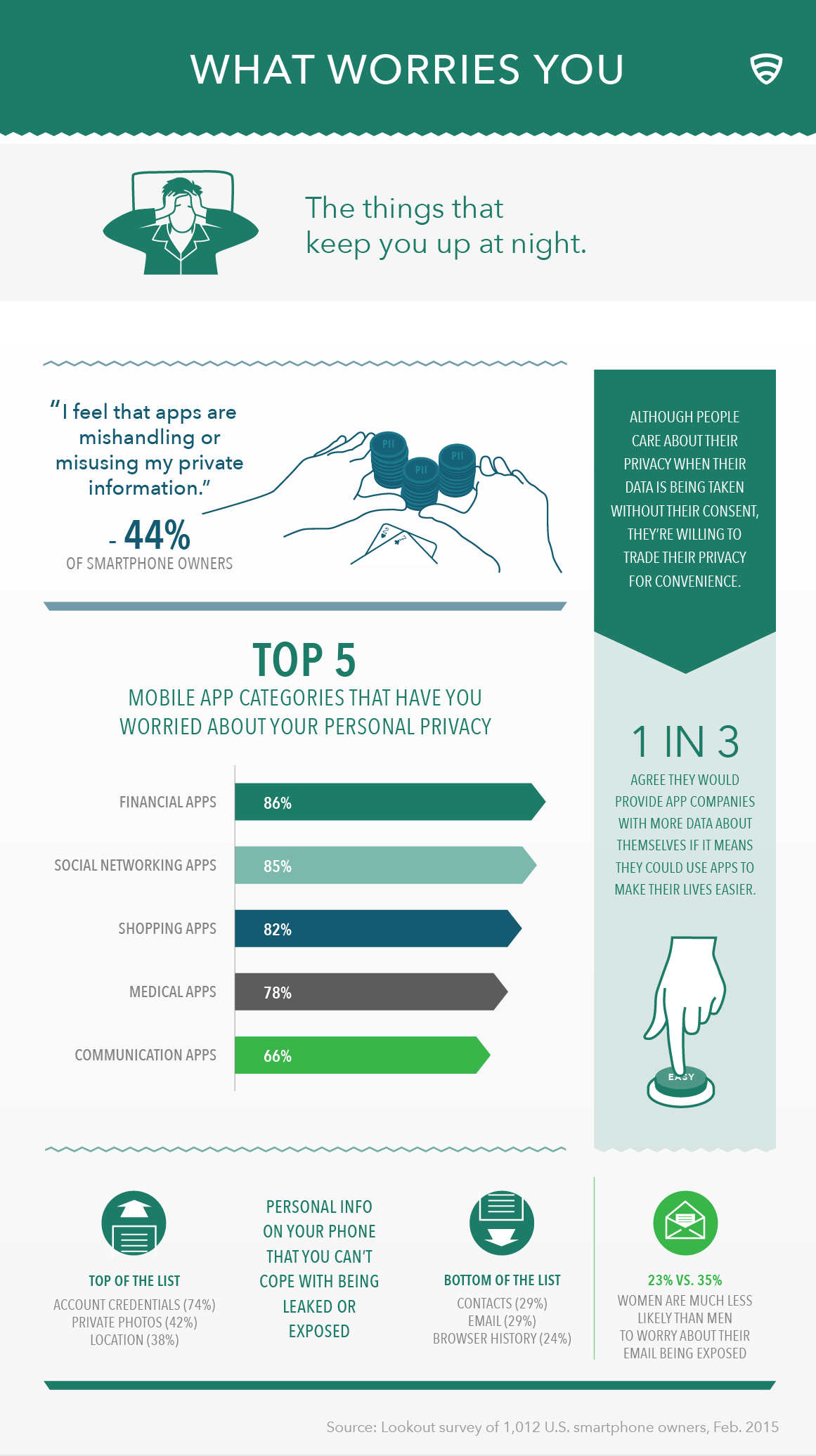Smartphone owners aren't as privacy minded as they think they are

A Pew Research study published last week on Americans' awareness of government surveillance programs revealed just 15 percent of American adults have changed their mobile phone habits in the wake of Edward Snowden's revelations.
Security firm Lookout has just released the findings of its study on mobile device use, and that echoes Pew Research’s findings, showing that while many mobile phone users claim to be highly aware of privacy issues, few actually do enough to safeguard their data, and many are willing to trade privacy for convenience. There’s bad news for businesses too, as a huge percentage of smartphone owners admit to not caring too much about protecting work data on their devices.
Lookout’s Mobile Privacy IQ study surveyed smartphone owners in the United States and found that 41 percent rated their mobile privacy IQ as "above average" or "well above average". 50 percent claimed to be just "average", while a mere 9 percent admitted to being "below" or "well below average".
Millennials claim to be the most privacy conscious age group, while older generations are the least. No surprise there really.
However, while being confident in their knowledge of mobile privacy, it turns out those who ranked themselves as well above average were likely to partake in risky mobile behavior with 35 percent happy to connect to open or public Wi-Fi networks. 34 percent admitted to not setting a PIN or passcode on their phone, 35 percent downloaded mobile apps from unofficial marketplaces, 37 percent revealed personal information on social networks, and 53 percent didn’t bother to read privacy policies before downloading a mobile app.
The most common risky behavior that smartphone owners admitted to were connecting to public or open Wi-Fi (76 percent), visiting unknown websites (61 percent), downloading apps without reading permissions (56 percent), plugging into public charging stations (37 percent) and downloading apps from unofficial market places (33 percent).
Smartphone owners say the topics that sparked the most privacy concerns are high-profile company data breaches (86 percent), mobile app data breaches (75 percent), Edward Snowden’s NSA revelations (73 percent, although 1 in 10 of those surveyed knew nothing about Snowden at all), and celebrity photo leaks (48 percent).

While 75 percent of respondents said they were ultimately responsible for their personal data, 5 percent claimed it was down to the US government. 10 percent said the mobile phone network, and 11 percent the company they were sharing data with.
The bad news for employers is nearly 60 percent of users care less about protecting work data on their phones than protecting their own personal information. Just 5 percent said they would take the most steps to protect work info, as opposed to 76 percent who would prioritize their own personal content. Think your friends have your back? Nope -- just 3 percent cared about protecting friends’ data.
Lookout sums up its findings by saying:
The results of Lookout’s Mobile Privacy IQ study highlight a gap that exists between awareness of privacy issues and the actions people are taking with their mobile devices to protect their privacy. While people claim to understand how to protect their privacy, they are still unknowingly partaking in behaviors that could put themselves and their employers at risk. Furthermore, they are still willing to trade privacy for convenience. Mobile devices have become the predominant computing platform for both work and pleasure, and thus house and have access to valuable personal and corporate data, making them rich targets for cybercriminals. As we lay the foundation for a connected world, the need to protect privacy, across all devices, will only continue to become increasingly important.
Lookout also provides the following tips to stay safe on your smartphone:
- Set a pin or passcode. Don’t jump on the "no passcode" bandwagon like nearly 35 percent of people who say they excel in mobile privacy. Set a passcode on your phone. It’s your first line of defense against prying eyes and thieves.
- On public Wi-Fi, limit email, social networking and only window shop. Public Wi-Fi networks are everywhere, but security for these networks is scarce, making it relatively simple for hackers to snoop on your Internet activity. Take a note from the 25 percent of smartphone owners who never connect to open Wi-Fi.
- The final "s" is key. 1 in 5 smartphone users never bother to check whether a URL leads with "https" before visiting a website on mobile. When browsing the web on mobile, take the extra step once the page has fully loaded to make sure the URL you’re visiting leads with "https". This ensures that your connection is secure.
- Clear your browsing history regularly. We found that 17 percent of people have never cleared their browsing and search history on their smartphone. Go above and beyond to protect your privacy if an unauthorized third-party ever gets hold of your device.
- Use discretion when downloading apps and pay attention to the apps ratings and reviews. Ultimately, don’t be afraid to just say 'no'. If you’re uncomfortable with the info an app is accessing, don’t hesitate to stop installation or delete it. In fact, 56 percent of smartphone owners have decided against installing an app after reading the privacy or permissions statement.
- If you’re not comfortable with broadcasting your location, turn Location Services off. Both Android and iOS phones have functionality that allows your location be broadcast to a number of services.
- And last but not least, download a mobile security app, like Lookout, that checks for malware and spyware, fights against phone loss and theft, and notifies you of the information apps on your phone are accessing.
Image Credit: Rudie Strummer / Shutterstock